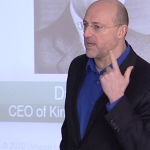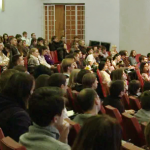
Alexandre Havard at Harvard University
In October 2012 I gave 2 lectures at the Harvard Law School and the Harvard Business School respectively. It is well known that many of the students at Harvard Business School and Harvard Law are preparing to be the future leaders of the United States and their respective home countries. At Harvard I focused on the pitfalls of rule-based Ethics and mentioned the desperate need for virtue-based ethics. I know that I was in the right place at the right time! In 1978, Alexander Solzhenitsyn gave his controversial Harvard Commencement address on a topic entitled “The Exhausted West,” in which he chastised the arrogance and smugness of Western materialistic culture, and called for the active defense of not so much human rights as human obligations. His speech profoundly disturbed the Harvard community at that time, as they had expected a diatribe against Soviet-era totalitarianism, His message was rejected. The failures of Western corporations and governments in our time are also failures of character and virtue. The popular response to date has been a rush to define, promote and enforce rules of ethics. This is a legalistic, coldly analytical response. But Solzhenitsyn, again in his Harvard Commencement address said, “I have spent all my life under a Communist regime and I will tell you that a society without any objective legal scale is a terrible one indeed. But a society with no other scale but the legal one is also less than worthy of man. A society based on the letter of the law and never reaching any higher fails to take advantage of the full range of human possibilities. The letter of the law is too cold and formal to have a beneficial influence on society. Whenever the tissue of life is woven of legalistic relationships, this creates an atmosphere of spiritual mediocrity that paralyzes man’s noblest impulses.” Solzhenitsyn predicted that “it will be simply impossible to bear up to the trials of this threatening century with nothing but the supports of a legalistic structure.” The economic collapse of 2008 is just one crisis that bears witness to the accuracy of his prophecy. Harvard University is charged today with preparing a new generation to repair the breach, but to do so, this new generation must be equipped with something of much greater substance than a rehashed presentation of ethical rules and constructs. If they are not so equipped, they are bound to experience frustration, failure and exhaustion even deeper than that which their predecessors experienced. Today’s Harvard University is mired in the quicksand of an ethical crisis that it created for itself. It is a crisis that trumpets a crying need for virtuous leadership, magnanimity and humility – and demonstrates the need for character building as the essential prerequisite to ethics training. A telling example of this crisis is Harvard’s recent announcement that it is investigating allegations of cheating that are unprecedented in anyone’s living memory. The cheating scandal being investigated is ironic to the point of being astonishing, involving fully half of the 279 students who took a course last Spring called “Introduction to Congress.”



Leave a Reply
Want to join the discussion?Feel free to contribute!